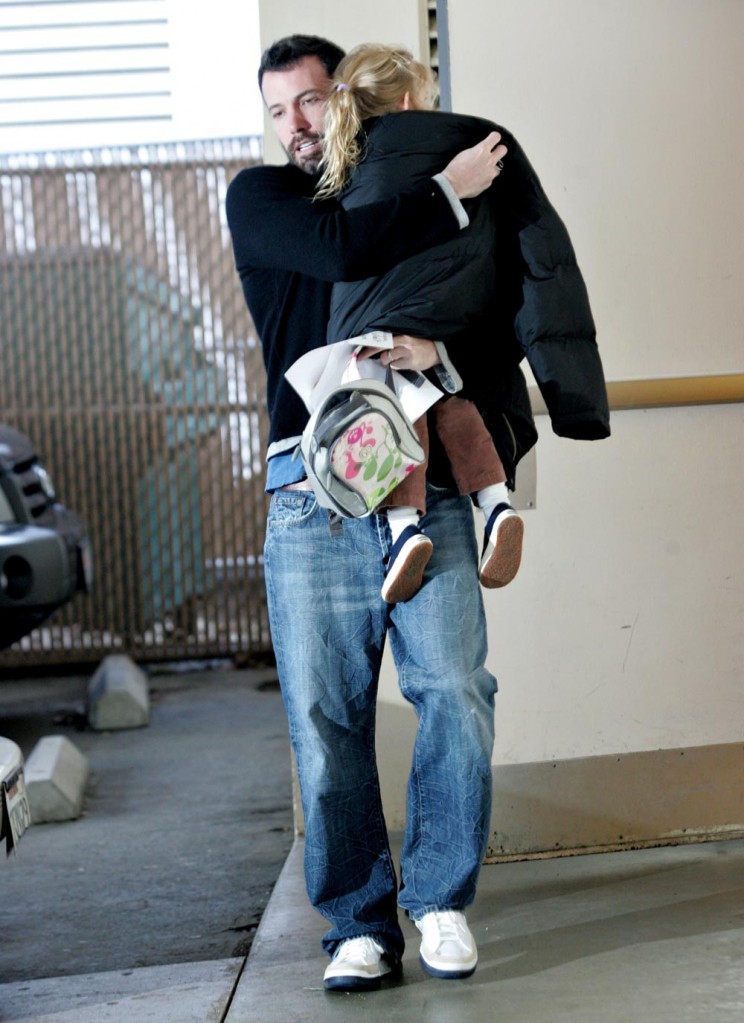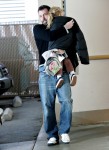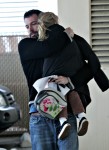
In the latest issue of Time Magazine, Ben Affleck contributed an essay about the civil war/genocide in eastern Congo. It’s a well-written, thoughtful, education essay, and Affleck writes about the situation with a surprising amount of depth. Last year, Affleck travelled to the Congo with Nightline, then again to film a short documentary which he premiered at the United Nations.
I thought about editing down the complete essay, but it should be read in its entirety. Affleck discusses with some depth the various tribal explanations for the decades-long civil strife, the lack of medical care or infrastructure, and what’s happening in eastern Congo now. Here’s the complete essay:
The picture of the eastern region of the Democratic Republic of Congo has grown tragically familiar: a region with great natural wealth, riven by war, racked with hunger and traumatized by a long history of colonial abuse, postcolonial kleptocracy and plunder. In the past 10 years alone, millions have died here, and more die each day as a result of the conflict. Most die not from war wounds but from starvation or disease. A lack of infrastructure means there is little medical care in the cities and none in rural communities, so any infection can be a death sentence. The most vulnerable suffer the worst. One in five children in Congo will die before reaching the age of 5-and will do so out of sight of the world, in places that camera crews cannot reach, deep in a vast landscape and concealed under a canopy of bucolic jungle.
It is common in the West to read about African lives in grim statistical terms, so we’ve become inured to these huge numbers of deaths. Making matters worse, the conflict in Congo is often seen as a hopelessly byzantine African tribal war, encouraging the damning notion that nothing will ever change. This, of course, creates a sense of hopelessness-and nothing cuts down on humanitarian, foreign and development assistance so much as the jaded diminution of hope. The nation most in need of investment gets the least by the cruel logic that it is the most broken. It is a self-fulfilling prophecy that ultimately fosters indifference in the guise of wisdom.
That should not be the case in Congo.
I’ve been traveling to Congo since 2007 to learn. Time has agreed to publish my amateur journalism on the merits of this urgent crisis and on my good luck with photographers. James Nachtwey, the world’s finest war photographer, accompanied me on one of my trips, and his extraordinary work fills the following pages.
The warring parties in the east can be distilled into three main groups: the Congolese army; a breakaway faction composed mainly of Tutsis, led by a former general, Laurent Nkunda; and an outlaw militia, the Democratic Liberation Forces of Rwanda (FDLR), led by the same Interahamwe Hutu extremists who committed the 1994 genocide of Tutsis in neighboring Rwanda.
Of late, most of the world’s focus has been on the fighting between President Laurent Kabila’s army and Nkunda’s forces. When I met Nkunda, he made a compelling case for his rebellion, framing it as opposition to Kinshasa’s cooperation with the génocidaires of the FDLR and offering a moving history of the persecution of the Tutsi. But like many militia leaders, Nkunda and his men have been accused of war crimes. I met a number of child soldiers who served in his militias, and his soldiers have been accused of participating in massacres in the villages of Bukavu and Kiwanga.
For its part, the FDLR has been present in eastern Congo for more than 14 years. Its members have committed many massacres of Tutsi civilians and have exploited the rich mineral resources of the region. The FDLR subjugates people either by rape (often performed in groups-and on people of either gender) or with the AK-47, a weapon so ubiquitous that it has picked up a tragic moniker: the Congolese credit card. Mary, the scarred woman in the center of the photo collage on the next two pages, told me that FDLR men raped her, set her house on fire and left her to die. She survived. Her 2-year-old daughter did not.
In interviews with Congolese civilians living under FDLR control, I consistently heard one thing: they wanted the génocidaires out. But many believe the only lasting solution will be a military one-and no Western nation has shown much interest in shipping troops to central Africa.
It is Africans themselves who are finding a way forward.
There have long been accusations that Nkunda was sponsored and supported by President Paul Kagame of Rwanda. But last month something happened that seems to have ended that debate. Congo and Rwanda joined forces. Kagame’s troops flushed out and arrested Nkunda, then helped facilitate a cease-fire with his forces in the National Congress for the Defense of the People (CNDP). Kabila’s government in Kinshasa made a deal to protect the new CNDP leader, Bosco Ntaganda (who is wanted for war crimes), and joined Rwandan forces in fighting the FDLR. Their joint effort has been under way for several weeks, and to date, there have been no civilian deaths as a result.
Remarkable things are happening in eastern Congo. The Congolese army and the CNDP are working together to separate Hutu civilians from Interahamwe commanders, and already hundreds have been freed. According to one expert on the region: “For the first time, Rwandan and Congolese, Tutsi and Hutu are working together to begin the long road of ethnic reconciliation.”
Hard choices remain. Will Nkunda, for example, be extradited from Rwanda? Kabila has promised that Rwandan troops will be out of Congo by March, but every day that they stay-and the thrill of Nkunda’s capture recedes-it becomes more difficult politically for him to sustain his bold initiative. None of this will be easy.
But after innumerable failed, internationally brokered peace efforts, a quietly engineered, bilateral African solution has broken a stalemate. Now there is at least a chance of something better for eastern Congo. Says Kagame, who has lived through civil war, genocide and two wars in Congo: “I have never been more hopeful than right now.”
From Time Magazine
In the past years, many Western countries looked at the Darfur genocide and declared that African problems need African solutions, which is, in polite terms, a cop-out. It’s interesting to learn that the Rwandan government is becoming much more active in eastern Congo, but it’s most likely a need to preserve their own borders and not have to outlay the resources for a refugee influx.
Under the leadership of Defense Secretary Robert Gates, NATO and the Pentagon have set up an elite unit of mostly American forces in central Africa, in the hopes of training soldiers in modern urban (sub-Saharan) combat, and as a check to aggressive, anti-American factions within countries like Kenya and the failed state of Somalia. There was some hope that these forces would also be used as a preventative measure against the kind of bloodshed and genocide seen in eastern Congo and Sudan, although it doesn‘t look like that mission has been received.
I hope that Affleck’s optimism has a real basis, with real solutions in Congo, and that this is new era in Rwandan-Congolese cooperation, and a new era in “African solutions for African problems”. God knows, the West won’t (or can’t) help.
Ben Affleck is shown picking up Violet from school on 2/9/09. Credit: Fame














One of the more intellilgent actors in hollywood…and a good father to boot.
I always find it so interesting that America goes to “fight terrorism” and we spend trillions of dollars on a fruitless war when we could’ve been feeding and clothing these people. You want to supposedly bring democracy to Iraq? What about water to Rwanda? Peace to Darfur???
I’m glad that Ben is more than just rugged good looks and I’m glad another celebrity has spoken out against what’s happening in other parts of the world right now.
It makes me sad to see how we as Americans, take so much for granted. Yes, our economy is awful right now, but you know, we’re not stuck in a war torn country with civil uprisings at any moment and no potable water. We are very rarely subjected to the kind of poverty and starvation that these innocent people must endure. And yet we feel we’re better, we feel we should go and bring democracy to nation-states who don’t want it, instead of using all that money to stop a real atrocity. Genocide.
But of course, we are hesitant to mark such events occurring in our world as genocide because under the Convention on the Prevention and Punishment of the Crime of Genocide, if we label it as such, it is considered a crime that we MUST act against. And god forbid we allow acting against something like genocide to cut into our “War on Terrorism.”
I’ve said it before and I’ll say it again: the rest of the world (specifically the US and China) is waiting for Africa to implode so they can swoop in and pick the carcass.
@ Baho. It’s sad because it’s true :(.
China will get first dibs. They’re already poised to do so. If the U.S. gets anything, it will be what China says we get. We’re owned by a communist country. Owned. Thanks big business, I mean our country’s “leaders”!
Unfortunately damned if we do and damned if we dont. “doing something” involves sending troops, which rubs both Africans and Americans the wrong way. Following what happened in Somalia in the 1990’s,there was severe political backlash in the US for becoming involved. Also, many of the fighting factions are anti-American, so our presence can inflame the situation.
We do need to be more involved in a situation, but best explanation why we dont is because we don’t want to upset China. considering their human rights violations and the US standpoint of business as usual, can we really be surprised at the US attitude for the Chinese neo-colony of Africa?
He is amazing. So deep and really got into the history and what is going on.
I love his serious approach. He’s not just stopping by for a couple of hoursand reads a page written by someone in the UN as part of his Oscar campaign (Jolie, anyone?).
Like GC, he is really studying the specific problem and trying to help.
Keep it up, Ben, you’re great.
A wonderful and insightful essay that brings to light a subject I had no clue about. Ben you’ve earned my respect.
i just want to say to Affleck that he must be clear : Kagame, kabila and museveni are committed in this chaos. So as a congolese, for me this essay is done to hide the true AND the rwandan involvement : 6 000 000 congolese died because of Kagame, kabila and some congolese’s betrial ; Affleck must stop fictionalize the situation in CONGO. He better talk to dR Denis mukwege who receive the olof prize this year to understand the real issue… we congolese are fed up with the hutu and tutsi issue because it is a rwandan issue so for real peace in DRC THESE PEOPLE MUST RETURN BACK IN THEIR COUNTRY AND STOP USING OUR COUNTRY AS A BATTLE LAND…Mr affleck must stop talking about an issue that beyond him ! Shame on you Mr Affleck and if you want to know the real issue go to friendofcongo website
To Bibi;
Yes—and please,readers,never think/assume that Dateline,Nightline,CNN,Time or any of the celebrities they use as mouthpieces,are giving you the whole story [regardless of whether the celebs are well intended.]…There is propaganda at work in the media ALWAYS. There is always a spin,a schtick,an emotional manipulation meant to [even subtley done so at times]persuade you to see and act a certain way. Gates setting up an anti terrorism center in AFrica is a nightmare waiting to happen,and will only exacerbate the situation. What’s worse,this is the INTENTION of setting up the center.
Divide and Conquer-ever heard of it? Create dissent and then quell it.
Oh,and get your hands on the helm,too. Control the situation,and thus control access to AFrican resources. Sickening.
Fair trade,[not tied aid that requires african countries to sell you their resources at your price,or to use your country’s contractors to set up dams,etc. Thereby requiring them to pay the money you lent them,directly back to contractors that were hand-picked by your country’s government.]
Fair trade is the way to go. Economy=health=peace,right?
I have a few sites I go to, but the quality is always the best here!
Hehehe nice essay ben! Time mag should be publishing more celeb articles.